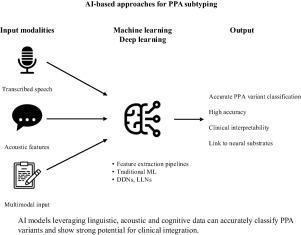利用语言和认知数据进行PPA亚型:基于人工智能方法的系统综述。
IF 3.9
2区 医学
Q1 CLINICAL NEUROLOGY
Progress in Neuro-Psychopharmacology & Biological Psychiatry
Pub Date : 2025-10-02
DOI:10.1016/j.pnpbp.2025.111514
引用次数: 0
摘要
原发性进行性失语症(PPA)是一种神经退行性疾病,其特征是语言能力逐渐和选择性下降。准确地将其分为三种临床变体-非流利/语法(nfvPPA),语义(svPPA)和逻辑缺失(lvPPA)-是必不可少的,但通常受到传统评估所需的时间和专业知识的限制。本系统综述评估了人工智能(AI)在使用语言和认知数据检测和分类PPA变体中的应用。按照PRISMA 2020指南,2014年至2024年间发表的14项同行评议研究被纳入其中。研究按输入方式分组:转录语音、声学特征、多模态数据和以语言为中心的神经心理学或基于任务的输入(不包括仅基于一般认知筛选工具的研究)。分析了每种方法的方法学方法、人工智能技术、分类性能和临床相关性。基于人工智能的方法在区分PPA变体方面表现出很高的准确性。转录的语言特征提供了实用有效的输入来源,而声学特征对nfvPPA的运动言语缺陷尤为敏感。多模态方法获得了最高的分类性能,基于任务的模型依赖于面向语言的标准化评估,产生了可解释和临床应用的结果。人工智能驱动的语言和认知数据分析显示出改善PPA诊断和亚型分类的强大潜力。未来的工作应解决局限性,如方法的可变性和缺乏病理验证。跨语言数据集、模型透明度和临床整合的进步将对更广泛的采用至关重要。本文章由计算机程序翻译,如有差异,请以英文原文为准。

Leveraging language and cognitive data for PPA subtyping: A systematic review of AI-based approaches
Primary Progressive Aphasia (PPA) is a neurodegenerative disorder marked by a gradual and selective decline in language. Accurate classification into its three clinical variants—nonfluent/agrammatic (nfvPPA), semantic (svPPA), and logopenic (lvPPA)—is essential but often limited by the time demands and expertise required for traditional assessments. This systematic review evaluates the application of artificial intelligence (AI) in the detection and classification of PPA variants using language and cognitive data. Following PRISMA 2020 guidelines, 14 peer-reviewed studies published between 2014 and 2024 were included. Studies were grouped by input modality: transcribed speech, acoustic features, multimodal data, and language-focused neuropsychological or task-based inputs (excluding studies based solely on general cognitive screening tools). Each was analyzed for methodological approach, AI technique, classification performance, and clinical relevance. AI-based approaches demonstrated high accuracy in distinguishing PPA variants. Transcribed linguistic features provided a practical and effective input source, while acoustic features were particularly sensitive to motor speech deficits in nfvPPA. Multimodal methods achieved the highest classification performance, and task-based models relying on language-oriented standardized assessments yielded interpretable and clinically applicable results. AI-driven analysis of language and cognitive data shows strong potential for improving PPA diagnosis and subtype classification. Future work should address limitations such as methodological variability, and lack of pathological validation. Advancements in cross-linguistic datasets, model transparency, and clinical integration will be essential for broader adoption.
求助全文
通过发布文献求助,成功后即可免费获取论文全文。
去求助
来源期刊
CiteScore
12.00
自引率
1.80%
发文量
153
审稿时长
56 days
期刊介绍:
Progress in Neuro-Psychopharmacology & Biological Psychiatry is an international and multidisciplinary journal which aims to ensure the rapid publication of authoritative reviews and research papers dealing with experimental and clinical aspects of neuro-psychopharmacology and biological psychiatry. Issues of the journal are regularly devoted wholly in or in part to a topical subject.
Progress in Neuro-Psychopharmacology & Biological Psychiatry does not publish work on the actions of biological extracts unless the pharmacological active molecular substrate and/or specific receptor binding properties of the extract compounds are elucidated.

 求助内容:
求助内容: 应助结果提醒方式:
应助结果提醒方式:


